Living The Liberal Dream - A RussiAAR
- Thread starter Psychedelic Sou
- Start date
-
We have updated our Community Code of Conduct. Please read through the new rules for the forum that are an integral part of Paradox Interactive’s User Agreement.
You are using an out of date browser. It may not display this or other websites correctly.
You should upgrade or use an alternative browser.
You should upgrade or use an alternative browser.
Episode VIII - Unleasing The Bear From Its Chains
Episode VIII - Unleasing The Bear From Its Chains
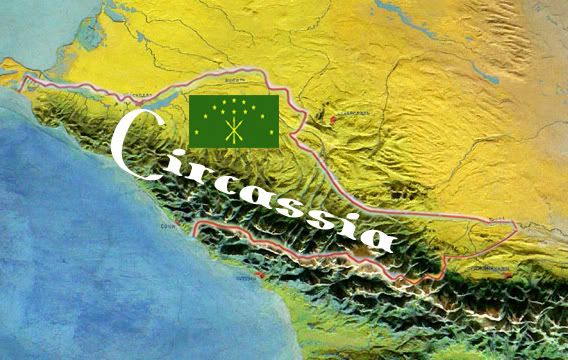
During the summer of 1842, tensions were once more building up in Circassia. While Eastern Circassia had been occupied by Russian forces 30 years earlier, the western part of the country was still relatively free. Since 1836 Russian strength in the region had diminished, thanks to the lowered defense budget, which had allowed the Circassians to break the Russian trade blockade of Suchumi and to obtain small arms from the Ottoman Empire. Re-armed, a new generation of Circassians was ready to reconquer the lost lands of their fathers. 20,000 Circassian infantry, the equivalent of 2 Russian infantry divisions, crossed the Russo-Circassian border to reconquer Eastern Circassia on the 21st of August 1841. This news was met with shock in Moscow, where recently attempts have been undertaken to peacefully incorporate Western Circassia in the Russian Empire. Vassilevsky was determined to halt this act of aggression against Mother Russia, and immediately pressed measures through the Duma to increase the military budget. Only 9 days after the Circassians had crossed the border, Cossacks from the Azov region were mobilized to defend Eastern Circassia.
Thanks to the industrialization plans from the Vassilevsky government, the Russian economy was now able to support a larger army. After the finishing of the Moscow-Kiev railway in late 1838, plans were made to build a Transcaucasus Railway that would connect Moscow to Baku, the capital of Azerbaijan. Construction on this line wasn't finished yet in 1841, but the line was completed far enough to allow the Azov Cossacks to travel from Azov to Suchumi in less than 12 days. By mid-September, the Russians had regained the upper-hand in the Circassian region once more, but had suffered heavy casualties against the Circassian infantry. Circassian infantry had laid siege to the town of Taman, killing over 15,000 Russian defenders (including over 9,000 civilians). The Circassians refused to surrender despite taking heavy losses, prefering to shoot themselves than to go in captivity. As a result, an entire generation of Circassian men, over 50,000 people, were killed when the Azov Cossacks laid siege to the town of Suchumi. By the 3rd of October the town had been pacified and the remaining free part of Circassia was annexed into the Empire of Russia when the Treaty of Suchumi was signed between the elders of the tribes of Circassia and the Russian foreign minister Paul Pavlovich. Circassia would remain a certain degree of autonomy, which allowed them to continue most of their local customs in peace, but they would have to accept the Acts passed by the Russian Duma and obey the Russian law. For the time being, the Caucasus was free of conflict.
While all this was taking place, another bitter argument had developed in the First State Duma. While the Slavophile party had won the 1840 General Election, they still hadn't taken care of one of the main issues during the election: the national flag. An attempt was made in early 1841 to make the Slavophile proposition the new state flag, but it didn't make it through the First State Duma because of the low unity between the Slavophile MoSD (= Members of State Duma). The vote had been lost by 255 vs 95 votes, which meant that a large of the Slavophile party was against their own proposition. But at the same time, Social Democrat attempts to get the white-blue-red flag through had failed as well. The flag issue was threatening the Vassilevsky government, who wasn't able to mobilize their own party or the opposition to support the black-yellow-white flag. He did gain the support of the Second State Duma, but this was worthless If he couldn't get the Imperial Flag Act through the First State Duma. Eventually, on the 15th of November 1842, the liberal MoSD Kurt Pavlev (a Volga German) held a speech in front of the First State Duma, stating that "This flag will be very important for our nation and for our people, and therefore we should chose the People's Flag. For If the people don't love their flag, it won't be so easy for them to show how much they love their country. And If they don't love their country, what reason would there be to defend it from foreign invasion? The will of the people is decisive in this matter, and therefore I support the white-blue-red tricolour as our national flag!". Pavlev's speech was met with an overwhelming applause, and the Imperial People's Flag Act was passed through the First State Duma on the 15th of November, and through the Second State Duma on the 21st of November 1842. Starting on the 1st of January 1843, the white-blue-red tricolour would be the official flag of the Empire of Russia.
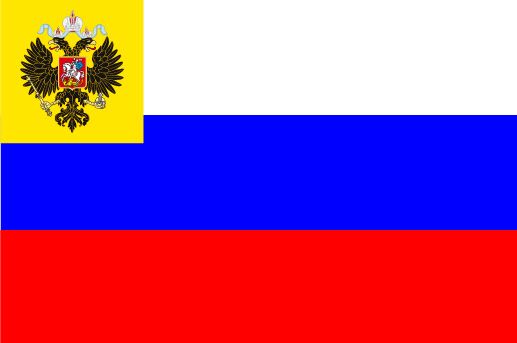
The new nation flag of the Empire of Russia, as decided by the Imperial People's Flag Act of 1842.

During the summer of 1842, tensions were once more building up in Circassia. While Eastern Circassia had been occupied by Russian forces 30 years earlier, the western part of the country was still relatively free. Since 1836 Russian strength in the region had diminished, thanks to the lowered defense budget, which had allowed the Circassians to break the Russian trade blockade of Suchumi and to obtain small arms from the Ottoman Empire. Re-armed, a new generation of Circassians was ready to reconquer the lost lands of their fathers. 20,000 Circassian infantry, the equivalent of 2 Russian infantry divisions, crossed the Russo-Circassian border to reconquer Eastern Circassia on the 21st of August 1841. This news was met with shock in Moscow, where recently attempts have been undertaken to peacefully incorporate Western Circassia in the Russian Empire. Vassilevsky was determined to halt this act of aggression against Mother Russia, and immediately pressed measures through the Duma to increase the military budget. Only 9 days after the Circassians had crossed the border, Cossacks from the Azov region were mobilized to defend Eastern Circassia.
Thanks to the industrialization plans from the Vassilevsky government, the Russian economy was now able to support a larger army. After the finishing of the Moscow-Kiev railway in late 1838, plans were made to build a Transcaucasus Railway that would connect Moscow to Baku, the capital of Azerbaijan. Construction on this line wasn't finished yet in 1841, but the line was completed far enough to allow the Azov Cossacks to travel from Azov to Suchumi in less than 12 days. By mid-September, the Russians had regained the upper-hand in the Circassian region once more, but had suffered heavy casualties against the Circassian infantry. Circassian infantry had laid siege to the town of Taman, killing over 15,000 Russian defenders (including over 9,000 civilians). The Circassians refused to surrender despite taking heavy losses, prefering to shoot themselves than to go in captivity. As a result, an entire generation of Circassian men, over 50,000 people, were killed when the Azov Cossacks laid siege to the town of Suchumi. By the 3rd of October the town had been pacified and the remaining free part of Circassia was annexed into the Empire of Russia when the Treaty of Suchumi was signed between the elders of the tribes of Circassia and the Russian foreign minister Paul Pavlovich. Circassia would remain a certain degree of autonomy, which allowed them to continue most of their local customs in peace, but they would have to accept the Acts passed by the Russian Duma and obey the Russian law. For the time being, the Caucasus was free of conflict.
While all this was taking place, another bitter argument had developed in the First State Duma. While the Slavophile party had won the 1840 General Election, they still hadn't taken care of one of the main issues during the election: the national flag. An attempt was made in early 1841 to make the Slavophile proposition the new state flag, but it didn't make it through the First State Duma because of the low unity between the Slavophile MoSD (= Members of State Duma). The vote had been lost by 255 vs 95 votes, which meant that a large of the Slavophile party was against their own proposition. But at the same time, Social Democrat attempts to get the white-blue-red flag through had failed as well. The flag issue was threatening the Vassilevsky government, who wasn't able to mobilize their own party or the opposition to support the black-yellow-white flag. He did gain the support of the Second State Duma, but this was worthless If he couldn't get the Imperial Flag Act through the First State Duma. Eventually, on the 15th of November 1842, the liberal MoSD Kurt Pavlev (a Volga German) held a speech in front of the First State Duma, stating that "This flag will be very important for our nation and for our people, and therefore we should chose the People's Flag. For If the people don't love their flag, it won't be so easy for them to show how much they love their country. And If they don't love their country, what reason would there be to defend it from foreign invasion? The will of the people is decisive in this matter, and therefore I support the white-blue-red tricolour as our national flag!". Pavlev's speech was met with an overwhelming applause, and the Imperial People's Flag Act was passed through the First State Duma on the 15th of November, and through the Second State Duma on the 21st of November 1842. Starting on the 1st of January 1843, the white-blue-red tricolour would be the official flag of the Empire of Russia.

The new nation flag of the Empire of Russia, as decided by the Imperial People's Flag Act of 1842.
EDIT: This part of the AAR has been temporarily withdrawn from the Paradox Forums because a part is missing. Because I have to work tomorrow, the next part won't be uploaded and finished by tomorrow night. Sorry for the inconvenience; this wasn't meant as a spamming bump post, but a genuine update. I noticed that the update wasn't complete after I pressed the "Post" button. I apologize of my mistake, but I promise I'll make it up to you with a gigantic update tomorrow
We can wait
Chapter IX - Bringing The Empire Closer and the 1846 General Election and Census
Chapter IX - Bringing The Empire Closer and the 1846 General Election and Census
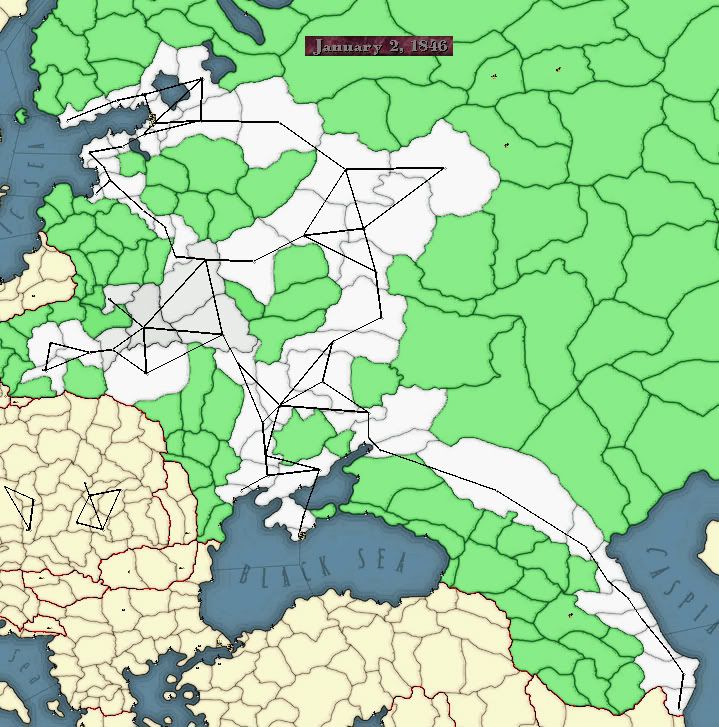
The 1845 Year Report presented to the First State Duma on the 2nd of January 1846 had some very positive news for the Russian Empire: the rapid expansion of the railroad system had the effect Alexander and Speransky had predicted: the Russian economy was back on its feet and rapidly expanding. The Imperial Russain Railroad Corporation has reported a yearly profit of £18250 was achieved (an average of £50 gain per day). This made it by far the most profitable organisation within in the entire Russian Empire. The entire GDP of Russia accounted for £29,200, which meant that more than half of the country's wealth came from the IRRC. The British GDP during the same year, 1845, was £45,360, which meant that the Russian Empire was finally catching up. But there was still a huge gap to be filled to push the British off the throne of the world. Currently, the Russian Empire is seen as the 4th World Power, behind Prussia, France and the United Kingdom. However, by 1846 our industrial capacity started to equal that of Prussia. Soon we'd be on the 3rd place.
Besides the rapid expansion of the Imperial Russian Railroad Corporation, alot of industrial complexes were build in the main urban areas, such as Kiev, St. Petersburg, Moscow and Minsk. Over 15 factories were built in the period of 1837-1846, pushing our industrial capacity up to 365.
In 1846, another General Election was called. Because of the rapid population growth registered in alot of areas, another census was called as well. The 1846 General Election wasn't anything special: it was once again the conservative Pyotr Vassilevsky going against the liberal Andresko Jonisk, with the debate being about the economy. They both didn't campaign much, being content with keeping the status quo and trying to keep the Social Democrats down. But the Social Democrats had different plans: they campaigned around the clock, taking it to the streets of Moscow and St. Petersburg to mobilize the workers class to stand up for more political rights and Universal Suffrage. Socialist demagogues went around the streets, urging people who were able to vote to vote Social Democrat. On the 2nd of June the results were in, and Pyotr Vassilevsky was in for a shock.
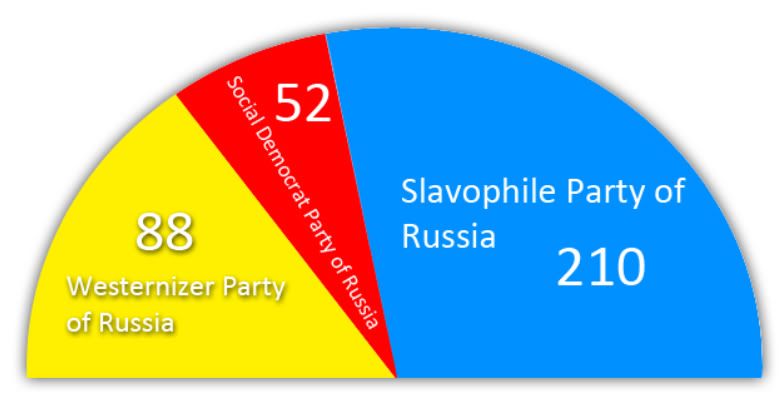
The Slavophile Party of Russia had lost its 2/3rd majority. While they still had recieved 60% of the votes, they had lost 53 seats in the First State Duma. This loss shocked Vassilevsky, who expected another landslide, to the core of his heart. The same day he announced his resignation from the Slavophile Party, leaving the party in disarray, and retreated to his dacha in the Ukraine. Embittered, he died only 3 months after the election. The big victor of this General Election was the Social Democrat Party of Russia: they had won 15% of the vote, more than doubling their seat count from 24 to 52. The Westernizer Party of Russia had made a seemingly insignificant move during the election campaign: for the first time in their existence, they openly embraced the Russian language and campaigned in their mother tongue. This small change had the effect of changing the minds of alot of dwindling conservative voters to vote liberal for once. One day after the election campaign, the 3rd of June 1846, coalition talks began between the Slavophile Party and the Westernizer Party. Although the Slavophile Party had enough votes and a big enough majority to form a homogeneous conservative government and to again dominate the First State Duma, the party was in disarray after the resignation of Vassilevsky and wasn't prepared to govern the nation alone without a strong leader. This was a godsend for Andresko Jonisk, who now had his first realistic chance of becoming the first liberal Prime Minister of the Russian Empire.
Jonisk's demands were high though: he wanted to speed up the liberalisation process of Russia and privative the Imperial Russian Railway Corporation to increase the system's efficiency. But the Slavophile party refused to budge, and the negotiations broke down into a quagmire of unresolved issues. While all this was going on, the Social Democrat party held onto its campaigning on the streets, calling for electoral reform, which eventually cumulated into violent outbursts on the streets of Minsk and Smolensk. Jonisk realized he had to act quickly before the country descended into civil war, and opened up negotiations with the Social Democrat party. The goal of these negotiations were the formation of a minority government with Jonisk as Prime Minister, and in return the new State Duma would look into a certain degree of electoral reform. However, the Social Democrats had by now added another demand to their (already considered radical) list of demands: the federalization of the Empire.
Jonisk, who was short on time, promised the State Duma would look into both these issues and that after several debates in the State Duma a new constitution could be drafted up. But Jonisk started to fear that his new position of power would be compromised by the radical agenda of the Social Democrats. In secret, he began negotiating with a group of breakaway Slavophile MoSD's. But besides all these worries, Jonisk also had some good news to brighten up his day. The 1846 census results were in:
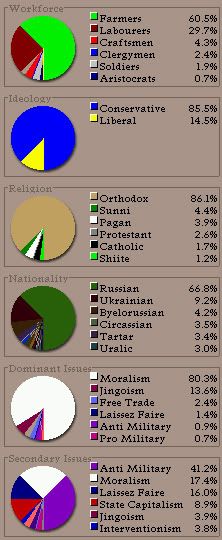
The worker population within the Russian Empire had more than doubled in just 10 years, which meant that the industrialization of Russia was well underway. The amount of ethnically Russian people within the Empire wasn't growing as rapidly as the other ethnic groups within the Empire: the population had grown by 3 million people in 10 years, but the amount of Russians within the Empire had dropped from 67% to 66,8%. The people within the Empire are still deeply religious and against the military, except when in dire need. Overall, the census gave an impression of how Russia was shaping up to be, and Jonisk liked it. Although Russia was still a mainly agricultural land, the industries were expanding rapidly and the agricultural sector was also becoming more profitable and more industrial. He sent the report to Tsar Alexander II, who was pleased with the results, but rather worried by the large amount of people within the Empire who still preferred conservative politics above the liberal reforms.

The 1845 Year Report presented to the First State Duma on the 2nd of January 1846 had some very positive news for the Russian Empire: the rapid expansion of the railroad system had the effect Alexander and Speransky had predicted: the Russian economy was back on its feet and rapidly expanding. The Imperial Russain Railroad Corporation has reported a yearly profit of £18250 was achieved (an average of £50 gain per day). This made it by far the most profitable organisation within in the entire Russian Empire. The entire GDP of Russia accounted for £29,200, which meant that more than half of the country's wealth came from the IRRC. The British GDP during the same year, 1845, was £45,360, which meant that the Russian Empire was finally catching up. But there was still a huge gap to be filled to push the British off the throne of the world. Currently, the Russian Empire is seen as the 4th World Power, behind Prussia, France and the United Kingdom. However, by 1846 our industrial capacity started to equal that of Prussia. Soon we'd be on the 3rd place.
Besides the rapid expansion of the Imperial Russian Railroad Corporation, alot of industrial complexes were build in the main urban areas, such as Kiev, St. Petersburg, Moscow and Minsk. Over 15 factories were built in the period of 1837-1846, pushing our industrial capacity up to 365.
In 1846, another General Election was called. Because of the rapid population growth registered in alot of areas, another census was called as well. The 1846 General Election wasn't anything special: it was once again the conservative Pyotr Vassilevsky going against the liberal Andresko Jonisk, with the debate being about the economy. They both didn't campaign much, being content with keeping the status quo and trying to keep the Social Democrats down. But the Social Democrats had different plans: they campaigned around the clock, taking it to the streets of Moscow and St. Petersburg to mobilize the workers class to stand up for more political rights and Universal Suffrage. Socialist demagogues went around the streets, urging people who were able to vote to vote Social Democrat. On the 2nd of June the results were in, and Pyotr Vassilevsky was in for a shock.

The Slavophile Party of Russia had lost its 2/3rd majority. While they still had recieved 60% of the votes, they had lost 53 seats in the First State Duma. This loss shocked Vassilevsky, who expected another landslide, to the core of his heart. The same day he announced his resignation from the Slavophile Party, leaving the party in disarray, and retreated to his dacha in the Ukraine. Embittered, he died only 3 months after the election. The big victor of this General Election was the Social Democrat Party of Russia: they had won 15% of the vote, more than doubling their seat count from 24 to 52. The Westernizer Party of Russia had made a seemingly insignificant move during the election campaign: for the first time in their existence, they openly embraced the Russian language and campaigned in their mother tongue. This small change had the effect of changing the minds of alot of dwindling conservative voters to vote liberal for once. One day after the election campaign, the 3rd of June 1846, coalition talks began between the Slavophile Party and the Westernizer Party. Although the Slavophile Party had enough votes and a big enough majority to form a homogeneous conservative government and to again dominate the First State Duma, the party was in disarray after the resignation of Vassilevsky and wasn't prepared to govern the nation alone without a strong leader. This was a godsend for Andresko Jonisk, who now had his first realistic chance of becoming the first liberal Prime Minister of the Russian Empire.
Jonisk's demands were high though: he wanted to speed up the liberalisation process of Russia and privative the Imperial Russian Railway Corporation to increase the system's efficiency. But the Slavophile party refused to budge, and the negotiations broke down into a quagmire of unresolved issues. While all this was going on, the Social Democrat party held onto its campaigning on the streets, calling for electoral reform, which eventually cumulated into violent outbursts on the streets of Minsk and Smolensk. Jonisk realized he had to act quickly before the country descended into civil war, and opened up negotiations with the Social Democrat party. The goal of these negotiations were the formation of a minority government with Jonisk as Prime Minister, and in return the new State Duma would look into a certain degree of electoral reform. However, the Social Democrats had by now added another demand to their (already considered radical) list of demands: the federalization of the Empire.
Jonisk, who was short on time, promised the State Duma would look into both these issues and that after several debates in the State Duma a new constitution could be drafted up. But Jonisk started to fear that his new position of power would be compromised by the radical agenda of the Social Democrats. In secret, he began negotiating with a group of breakaway Slavophile MoSD's. But besides all these worries, Jonisk also had some good news to brighten up his day. The 1846 census results were in:

The worker population within the Russian Empire had more than doubled in just 10 years, which meant that the industrialization of Russia was well underway. The amount of ethnically Russian people within the Empire wasn't growing as rapidly as the other ethnic groups within the Empire: the population had grown by 3 million people in 10 years, but the amount of Russians within the Empire had dropped from 67% to 66,8%. The people within the Empire are still deeply religious and against the military, except when in dire need. Overall, the census gave an impression of how Russia was shaping up to be, and Jonisk liked it. Although Russia was still a mainly agricultural land, the industries were expanding rapidly and the agricultural sector was also becoming more profitable and more industrial. He sent the report to Tsar Alexander II, who was pleased with the results, but rather worried by the large amount of people within the Empire who still preferred conservative politics above the liberal reforms.
Good AAR,what´s the actual status of your army?And,what is that nation between Austria and the Ottoman Empire
Last edited:
Good AAR,what´s the actual status of your army?And,what is that nation between Austria and the Ottoman Empire
I've kept all the divisions from the start of the game and I've begun recruiting 5 new ones, so I think I've got around 20 divisions now. But I'll do a more extensive update on the army within the next two updates.
That country between Austria and the Ottoman Empire is in fact 2 countries: Moldovia and Wallachia (who later form Romania), who are satellite nations from the Ottoman Empire at the start of the game.
I've kept all the divisions from the start of the game and I've begun recruiting 5 new ones, so I think I've got around 20 divisions now. But I'll do a more extensive update on the army within the next two updates.
That country between Austria and the Ottoman Empire is in fact 2 countries: Moldovia and Wallachia (who later form Romania), who are satellite nations from the Ottoman Empire at the start of the game.
I´m speaking about that one that is west of Wallachia
Looking good.
I'm enjoying this AAR particularly because I tried to do a similar thing in my first real attempt at Russia, and everyone on the forums told me I was doing it wrong.
I'll be interested to see you this turns out.
I'm enjoying this AAR particularly because I tried to do a similar thing in my first real attempt at Russia, and everyone on the forums told me I was doing it wrong.
I'll be interested to see you this turns out.
I´m speaking about that one that is west of Wallachia
Ow, that's Austria
What exactly did you do wrong according to the forums?Wombats O' War said:Looking good.
I'm enjoying this AAR particularly because I tried to do a similar thing in my first real attempt at Russia, and everyone on the forums told me I was doing it wrong.
I'll be interested to see you this turns out.
I've never seriously attempted to play a Grand Campaign, besides two Belgium and Italy campaigns. But back then I didn't understand how the economic system worked, so this is my first real Vicky game
Ow, that's Austria
No,Norht of the Ottomans South of the Austrians and west of Wallachia
No,Norht of the Ottomans South of the Austrians and west of Wallachia
Oow, that's Serbia
Chapter X - Strengthening the Bear
Chapter X - Strengthening the Bear
The economical reforms and the industrialization of the mid-1830's to the mid-1840's had created an economic environment stable enough and a budget surplus big enough to allow for an increase of the defence budget. This was deemed necessary by the new liberal-social democrat minority government to defend the population from the Asiatic hordes from Khiva and Bhukaran, who frequently raided settlements in these border regions. A large recruitment campaign was started within Russia's extensive lower and (smaller) middle classes. Trips to exotic, far-away places and patriotism were key to the campaign, consisting of 5 different colourized and illustrated posters.
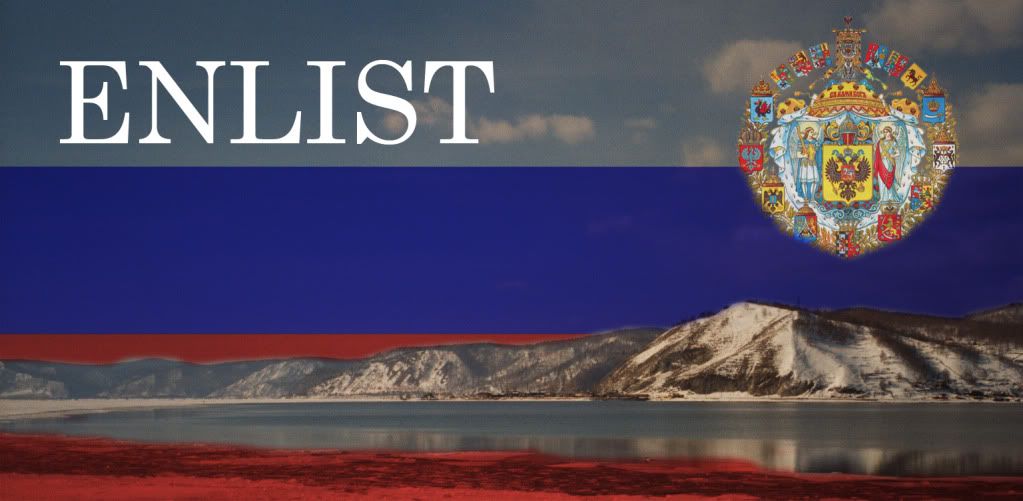
An impression of what these recruitment posters looked like. This one is targeting the English-speaking communities in Moscow and St. Petersburg, who had fled the oppressive political climate in the United Kingdom.
As a result, within three weeks of the campaign launch, over 150,000 new recruits were enlisted into the Imperial Army. 75,000 men went to reinforce already excisting formations, 5,000 to small military detachments in Finland, with the remaining 70,000 divided up into 7 new army divisions. The War Ministry was replaced by a permanent High Command, with General Vibrech Stormnivik appointed as the new Chief Commander. He decided it was time for a major overhaul of the Russian chain of command, and completely changed the Order of Battle.
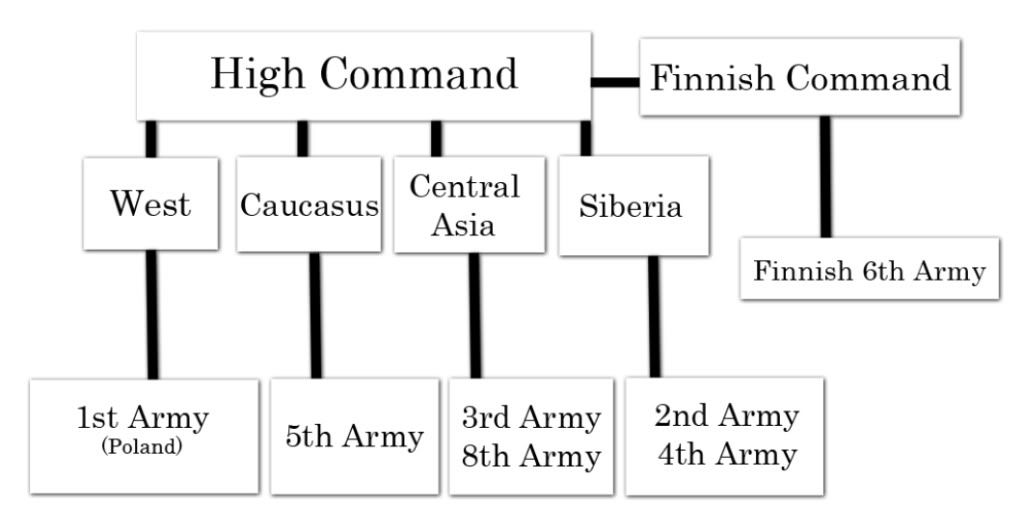
Five new commands were set up: 4 subordinate to the High Command, one independent command (Finnish Command). The 4 commands subordinate to the High Command were Command West, Command Caucasus, Command Central Asia and Command Siberia. From the newly formed divisions, 4 were deployed to the newly established Command Central Asia, forming the new 8th Army. After spending 8 weeks training for the region's harsh climate, they crossed the border into Khiva. The Khivan Army was badly equipped, poorly trained and few in numbers and were soon overwhelmed by the superior Russian hordes, who were equipped with new bolt-action rifles and high on morale. Khiva was soon occupied and annexed into the Russian Empire, securing an important part of the Imperial border. Next up: Bhukara.
The economical reforms and the industrialization of the mid-1830's to the mid-1840's had created an economic environment stable enough and a budget surplus big enough to allow for an increase of the defence budget. This was deemed necessary by the new liberal-social democrat minority government to defend the population from the Asiatic hordes from Khiva and Bhukaran, who frequently raided settlements in these border regions. A large recruitment campaign was started within Russia's extensive lower and (smaller) middle classes. Trips to exotic, far-away places and patriotism were key to the campaign, consisting of 5 different colourized and illustrated posters.

An impression of what these recruitment posters looked like. This one is targeting the English-speaking communities in Moscow and St. Petersburg, who had fled the oppressive political climate in the United Kingdom.
As a result, within three weeks of the campaign launch, over 150,000 new recruits were enlisted into the Imperial Army. 75,000 men went to reinforce already excisting formations, 5,000 to small military detachments in Finland, with the remaining 70,000 divided up into 7 new army divisions. The War Ministry was replaced by a permanent High Command, with General Vibrech Stormnivik appointed as the new Chief Commander. He decided it was time for a major overhaul of the Russian chain of command, and completely changed the Order of Battle.

Five new commands were set up: 4 subordinate to the High Command, one independent command (Finnish Command). The 4 commands subordinate to the High Command were Command West, Command Caucasus, Command Central Asia and Command Siberia. From the newly formed divisions, 4 were deployed to the newly established Command Central Asia, forming the new 8th Army. After spending 8 weeks training for the region's harsh climate, they crossed the border into Khiva. The Khivan Army was badly equipped, poorly trained and few in numbers and were soon overwhelmed by the superior Russian hordes, who were equipped with new bolt-action rifles and high on morale. Khiva was soon occupied and annexed into the Russian Empire, securing an important part of the Imperial border. Next up: Bhukara.
All my AAR's have been put on hold indefinately. Alot of IRL stuff has come up lately and I simply cannot afford to spend any extra time writing on them, and I hardly find time to play. I'll spare you the boring details, I just completely fucked up something very important to me and I need all my time to get things right again. I probably won't be able to update for the upcoming 2/3 weeks almost certain. After that I'll see how the situation develops.
I'm sorry for anyone who was following this AAR, but IRL problems > Internet. I hope you all understand
I'm sorry for anyone who was following this AAR, but IRL problems > Internet. I hope you all understand

